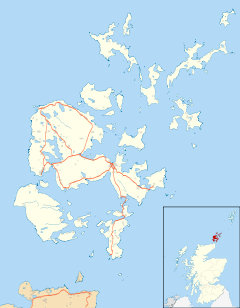Pierowall
| Pierowall | |
|---|---|
 The bay at Pierowall |
|
| Pierowall shown within Orkney | |
| OS grid reference | HY4348 |
| Civil parish | |
| Council area | |
| Lieutenancy area | |
| Country | Scotland |
| Sovereign state | United Kingdom |
| Post town | Kirkwall |
| Postcode district | KW17 |
| Dialling code | 01857 |
| Police | Scottish |
| Fire | Scottish |
| Ambulance | Scottish |
| EU Parliament | Scotland |
| UK Parliament | |
| Scottish Parliament | |
Pierowall is a village of Westray in the Orkney Islands, off the coast of the northern Scottish mainland. The village is the island's largest settlement and lies near its northern end, around Pierowall Bay. It has a variety of historical remains dating from the Neolithic, the Iron Age, the Middle Ages, and later, including a large pagan Norse cemetery.
Although it is only a village on an island which had a total population of 563 at the census of 2001, Pierowall has a post office, a bank, a junior high school, shops, a hotel, and a fire station.
Supplementing the ferries which come into Pierowall Harbour, some seven miles to the south of the village is the main ferry terminal at Rapness, on the southernmost tip of Westray, which has better ferry links with Papa Westray and Kirkwall.
Pierowall has a maritime climate, with cool summers, mild winters, strong winds, and above average rainfall. Visitors can stay in the centre of the village at the Pierowall Hotel.
In a Neolithic chambered cairn near the village, complex carving can be seen on a stone which was probably a lintel. This is thought to originate in the same culture which produced similar carvings at Newgrange in County Meath, Ireland. Pierowall also has an important example of the circular dry-stone Atlantic roundhouses which date from the Iron Age.
Away to the west are the ruins of Noltland Castle, built by Gilbert Balfour in the 16th century, notable for its massive spiral staircase "second only to Fyvie Castle, while its triple tiers of gunloops are without parallel in Scotland, if not Europe".
...
Wikipedia

